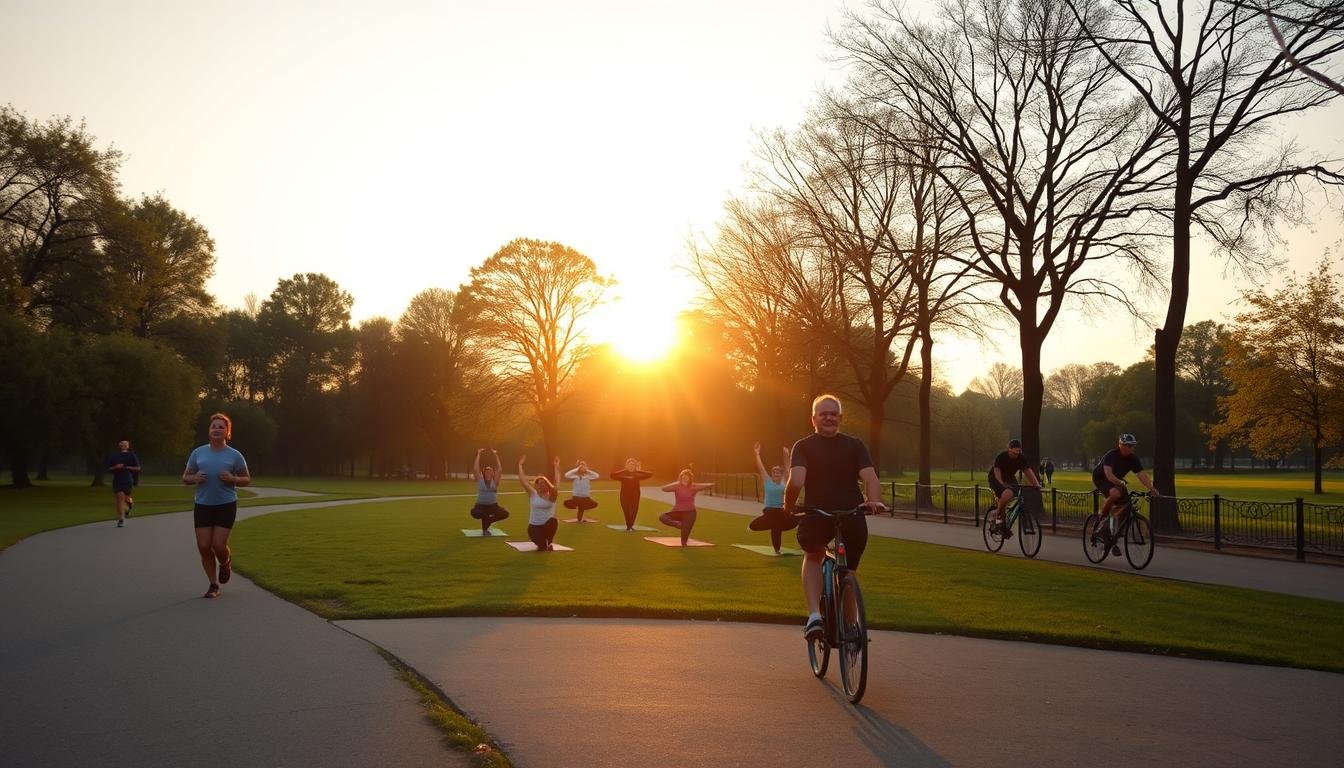There’s no single study that says when is the best time to exercise for weight loss or gain. But, research shows that when you work out can affect your health. For example, afternoon workouts might help lower blood pressure and improve performance.
On the other hand, exercising in the evening could help control blood sugar levels for people with type 2 diabetes. So, the best time to exercise really depends on what works best for you.
When it comes to exercise, timing is everything. Morning, afternoon, or evening workouts all have their benefits. Understanding how your body’s natural rhythms and your lifestyle affect your exercise routine is key.
It’s also important to consider how your energy levels and personal preferences impact your workout schedule. This way, you can find the perfect time to exercise that suits your needs and goals.
Introduction
Exercise timing can greatly affect how well you do and how much you benefit. It’s not the same for everyone. Things like when you feel most energetic, your natural body clock, and your daily routine all play a part.
Factors Affecting Optimal Exercise Time
Knowing these factors helps you create a workout plan that works best for you. For example, exercising in the morning can help you eat better all day. On the other hand, working out at night can make your muscles stronger.
Things like how well you sleep and what you like to eat also matter. Good sleep is key for morning workouts. And what you eat before working out can vary from person to person.
Finding the optimal exercise timing for you is about mixing these factors with what you like and your daily routine. The goal is to pick a schedule that fits you well. This way, you can stick to it and get the most out of your workouts.
Morning Workouts: A Fresh Start to the Day
Starting your day with exercise can be a great idea. Morning workouts give you a boost of energy and a better mood. They might even help you lose weight.
Benefits of Early Morning Exercise
Exercising in the morning can reset your body’s clock. This can lead to better health and weight control. A study showed that women who worked out in the morning lost more body fat than those who exercised at night.
Also, starting your day with exercise can make it easier to stick to your routine. It takes about 66 days to make it a habit. The calm morning mind helps you get into the routine.
Weight Loss and Morning Workouts
Morning workouts can help with weight loss by controlling hunger. A study found that morning exercise can reduce hunger later in the day.
A 2022 Stanford study found a “hunger-fighting molecule” in exercise. This shows how exercise, timing, and hunger are connected. The right workout can affect how hungry you feel.
While morning workouts are beneficial, they work differently for everyone. It’s best to talk to a fitness expert. They can help you find the best exercise plan for your health and weight loss goals.
Afternoon Exercise: Peak Performance and Blood Pressure Benefits
Looking to get the most out of your workout? The afternoon might be the best time. Research shows that physical performance peaks between 4 p.m. and 8 p.m. This means you can work harder and see better results.
Afternoon exercise also helps lower blood pressure. This is great news for people with high blood pressure. It can help manage this condition.
| Metric | Afternoon Exercise | Morning Exercise |
|---|---|---|
| Physical Performance | Peaks between 4 p.m. and 8 p.m. | Lower compared to afternoon |
| Blood Pressure | Lower than morning exercise | Higher than afternoon exercise |
| Potential Benefits | Greater strength, endurance, and reduced injury risk | Increased metabolism and improved sleep quality |
The body’s internal clock, or circadian rhythms, might explain why afternoon exercise is better. It helps optimize physical performance and other functions during late afternoon and early evening.
While morning and evening workouts have their benefits, the afternoon might be the best for those wanting to improve their exercise routine. It offers health advantages like better blood pressure and enhanced physical abilities.
The Best Time of Day to Exercise for You
There’s no single best time to exercise for everyone. The right time depends on your personal schedule and how you feel. Things like your sleep, work hours, and energy levels play a big role.
Personalized Exercise Plans
Creating a plan that fits your life can help you find the best exercise time. For instance, a study with 51 healthy teens showed morning runs improved their sleep and mood. They also felt more alert during the day.
Lifestyle Factors for Exercise Timing
| Lifestyle Factor | Optimal Exercise Timing |
|---|---|
| Early Morning Risers | Morning workouts can enhance consistency and habit formation. A study showed morning exercisers achieved consistency with a stretching routine nearly 50 days sooner than those who stretched in the evening. |
| Individuals with Obesity | Evening workouts, between 6 p.m. and midnight, were associated with the lowest risk of mortality and cardiovascular disease, according to a study in Diabetes Care. |
| Older Adults | Low-intensity exercise in the evening can improve sleep quality for older adults, according to research. |
So, the best exercise time is what fits your life and preferences. Being consistent is important. Find a schedule that works well with your daily routine to see real progress.
Evening Fitness Sessions: Stable Blood Sugar Levels
Adding evening workouts to your routine can boost your health, mainly by keeping blood sugar stable. Research shows that evening fitness sessions, from 6 p.m. to midnight, help those with obesity control their blood sugar levels.
Cardiovascular Benefits of Evening Workouts
Evening aerobic exercise also improves insulin sensitivity and lowers blood pressure. This is good for your heart. A study with 186 adults, aged 46.8 on average and with a BMI of 32.9, found a difference. Those who worked out in the evening had a 1.28 mg/dL lower glucose reading than those who didn’t.
The Netherlands Epidemiology of Obesity study backs this up. It had 6,700 participants. The study showed that afternoon exercise cut insulin resistance by 18%. Evening exercise reduced it by 25%.
This research shows how important it is to think about when you exercise. Evening workouts are key for managing blood sugar levels and heart health.
Circadian Rhythms and Exercise
The body’s internal clock, or circadian rhythms, is key to how well we exercise. Our natural body clock affects muscle strength, endurance, and how fast we recover. Knowing how our rhythms impact our workouts helps us plan better, matching our exercise to our body’s natural rhythm.
How Biological Clocks Influence Exercise
Our internal 24-hour cycle, or circadian rhythm, controls many body functions like sleep and hormone levels. This cycle affects how well we exercise. For instance, our body temperature is highest in the late afternoon, boosting our metabolic and physical abilities.
Studies reveal that strength and power exercises are 3-15% better in the evening than in the morning. Morning workouts might help with weight loss, as our muscles are better at burning sugar and fat then. But, evening workouts are better for strength and power, as our body is ready for peak performance.
Our sleep type, whether we’re a “lark” (morning person) or an “owl” (night owl), also plays a role. Larks do better in the morning, while owls shine in the evening. Planning workouts based on our natural rhythm and sleep habits can improve our performance.
Evening workouts are generally better for strength and power, but morning exercise is better than nothing, for those who don’t exercise much. More research is needed to understand how our sleep patterns affect when we should work out.
Workout Scheduling: Consistency is Key
Consistency is key to reaching your fitness goals. While some might find certain times better for workouts, the goal is to fit exercise into your life. This makes it easier to stick to.
Research shows late afternoon and early evening might be best for workouts. This is when your body is at its peak, improving performance and reducing injury risk. But, the most important thing is to find a time that works for you.
Try different times to see when you feel best. This helps match your workouts with your natural energy levels. For intense workouts, a light meal before can give you energy. Others prefer to exercise on an empty stomach for lighter activities.
It doesn’t matter when you work out, as long as you stick to it. Picking a time that fits your day is key for keeping up with exercise. Kim Duke, a certified trainer in Ellicottville, NY, says, “A consistent routine becomes a habit after a couple of weeks.”
The best exercise plans are ones you can keep up with. Find a time that works for you and your lifestyle. This will help you reach your fitness goals through regular and consistent workouts.
Energy Levels and Exercise
Getting the most out of your workouts isn’t just about going to the gym. It also depends on your energy levels all day. Your sleep, what you eat, and your health all play big roles in how much energy you have. They help decide the best time for you to exercise.
Fueling Your Body for Optimal Performance
It’s key to eat right before and after working out to boost your energy and fitness. Eat a mix of carbs, proteins, and healthy fats to fuel your body. Drinking water all day can also help you perform better during exercise.
The U.S. Department of Health and Human Services says healthy adults should do 150 minutes of moderate aerobic activity or 75 minutes of vigorous activity weekly. Doing more, like 300 minutes, can bring even more health benefits. Adding strength training two times a week can also improve your fitness.
Creating a workout plan that fits your energy ups and downs and fuels your body right can help you reach your fitness goals better.
Conclusion
Finding the best time to exercise is very personal. It depends on what you like, your body’s natural rhythms, how much energy you have, and your daily life. Research shows benefits in morning, afternoon, and evening workouts. But, the most important thing is to pick a routine that works for you and helps you reach your fitness goals.
Creating personalized exercise plans and sticking to consistent exercise can unlock your workout’s full power. Whether it’s a morning jog, an afternoon gym visit, or an evening yoga class, the right time is the one that fits into your day. It should support your health and happiness.
The best time of day to exercise for you is the one that suits your unique needs and likes. Listen to your body and try different times for workouts. This way, you can find the perfect schedule that helps you stay fit and healthy.





